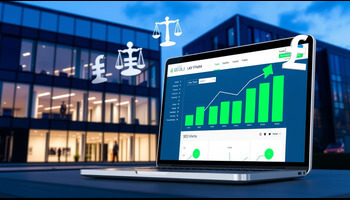How to Use Google Analytics to Improve SEO for Law Agencies
As a lawyer, you are well aware of the importance of meticulously gathering and analysing every piece of information to build a strong case. You might be surprised to find that the same applies to search engine optimisation (SEO). Understanding the intricacies of SEO is vital for law firms aiming to enhance their online presence. By knowing how to use Google Analytics to improve SEO, you can unlock the potential to attract more clients, increase visibility, and ultimately ensure your firm’s online success.
Contents
What Is Google Analytics?
Before we explore how you can leverage Google Analytics to give your SEO campaigns a boost, first, let us discuss what exactly it is.
Developed by the people behind the world’s biggest search engine, Google Analytics is an SEO and web analytics tool offering basic and advanced statistics for website optimisation and online marketing. It can equip you with valuable data about your website’s performance, such as organic traffic, conversions, and bounce rates.
Besides SEO, Google Analytics can also be used to improve your other digital marketing campaigns, as it gives you useful insights into the online behaviour of potential clients. With such data at your disposal, you can determine the improvements you need to make to better fulfil your target audience’s needs. Google Analytics is free to install and can be used with other SEO analysis tools for better results.
4 Ways to Strengthen Your SEO Campaign with Google Analytics
If you already got Google Analytics installed on your website, congratulations. You’re all set and ready to go. If you haven’t, you can DIY the installation process or ask law firm SEO specialists (such as our team at Kinetic Traffic) for a more hassle-free experience. Once you have it set up, here’s how you can leverage Google Analytics to beef up your law firm’s SEO strategies.
1. Identify opportunities to increase organic traffic
A webpage’s search ranking may fluctuate over time. Fortunately, you can update the page and add new information to improve its ranking and ensure it continues to attract traffic. But the question is, how do you pinpoint the web pages you need to update?
On Google Analytics, go to Acquisition and Search Console before selecting Landing Pages. Look for content you can republish by choosing a time frame for comparison. Sort the table by clicks and then select the landing page you want to examine. Identify potential issues for the decline in search ranking and traffic and find patterns.

To ensure the continued effectiveness of your content, you should keep a few key considerations in mind. First, assess the relevance of your content over time. Changes may have occurred that render your previously useful information outdated or irrelevant. For example, if you wrote an article about a piece of tax legislation, you should verify if any significant changes have been made since then, as this could impact its usefulness to readers.
Second, investigate any fluctuations in search volumes for navigational queries that may have resulted in a decline in organic traffic. By analysing these patterns, you can gain insights into potential factors contributing to the decrease in traffic.
2. Track internal site search to identify new keyword opportunities
Most visitors use your site’s internal search engine to find specific content or services. What many site owners don’t realise is that Google Analytics can track these internal searches, helping you identify keywords missing a relevant landing page or do not match user intent.
To identify new keyword opportunities, make sure to collect several months of data. Navigate to Behaviour > Site Search to access the “Search Terms” report. Then, follow these steps:
- Apply filters to eliminate unnecessary long-tail keywords.
- Filter the report by search exit percentage and use the weighted sort type.
This simple prioritisation method in Google Analytics allows you to identify user queries that didn’t yield satisfactory results. It also tells you the number of visitors who left your website after an internal search. This should help you determine new keywords to target and the type of content you should publish next.
3. Improve page loading time
The speed at which your pages load not only significantly impacts user experience. It also plays a vital role in your search rankings. Therefore, if you are already investing in improving your SEO rankings, you should not neglect the impact of slow-loading pages.
To obtain the relevant data from Google Analytics, access the Site Speed Report under Behaviour. Here, you can review page loading times and execution speeds for various site interactions. If there are instances where web pages take too long to load, you must report the problem to your site developers as soon as possible.

4. Determine where to focus your SEO efforts
Knowing how to use Google Analytics to improve SEO can help you identify areas of your website that require your attention and immediate action. You can refer to the following metrics to make an informed decision:
Clicks – sorting by clicks reveals your top-performing pages. Ensure these web pages are up-to-date and can direct visitors to the relevant sections of your site. You should also determine how well they perform and convert.
Impressions – while these pages may not generate the most traffic, they possess untapped potential. Explore opportunities to optimise their SEO to capture a larger share of traffic. Consider creating content that can rank well in these areas to capitalise on the potential for increased traffic.
Avg Position – focus on pages that rank around positions 4 or 5 in search results. With some effort, you can push these pages to the coveted 1-3 positions, which yield significantly higher traffic. Target these low-hanging fruit opportunities and aim to improve their rankings for increased visibility and subsequent traffic gains.
Knowledge is Power in SEO
Using Google Analytics can be a game-changer for your law firm’s SEO strategies. By leveraging this powerful tool, you can gain valuable insights into your website’s performance and make data-driven decisions to enhance your online presence.
However, using Google Analytics to monitor your site’s performance can be time-consuming, especially with a limited SEO experience. If you’d rather focus on running your legal practice and winning cases, our team at Kinetic Traffic is more than qualified to track and improve your SEO strategies. Get in touch with us, and we’ll help your law firm leverage Google Analytics to achieve online success.
Lead your law firm towards the best results.
Get in touch with our team and let’s talk about your marketing needs.










